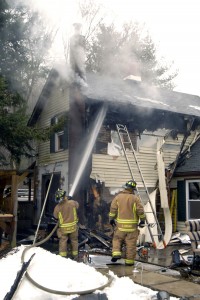
Westfield firefighters contain the fire as smoke alarms in the home could be heard sounding. Fire officials want to remind everyone that smoke and carbon monoxide detectors could save your life. (File photo by Frederick Gore)
WESTFIELD – Residents will lose an hour’s sleep Saturday night when Daylight Savings Time begins again and, while most will – eventually – remember to reset their clocks, fire officials both locally and across the state urge them to remember to change the batteries in their smoke and carbon monoxide detectors.
Westfield Dep. Chief Patrick Egloff said recently that batteries in the detectors should be changed twice a year and recommends that the batteries be swapped out at the same time clocks are changed.
He also said that at least two fatal incidents in little more than a year could have been averted by working detectors.
In January, 2011, two lives were lost in a house fire on Overlook Drive.
Egloff said that both victims died of smoke inhalation because there were no working smoke detectors in their home.
About a year later, he said, a woman died and her husband was hospitalized when a furnace malfunction filled their home on Elizabeth Avenue with carbon monoxide and they were not alerted by a detector.
“Neither one of those (homes) had a working detector” Egloff said, and went on to say “working detectors would have saved the lives in both of those (incidents).”
In Southwick, Fire Chief Rick Anderson said that tragedy was averted and two lives were saved by firefighters in November, 2011, despite the lack of working smoke detectors.
Anderson said “One of our EMTs smelled something funny outside” and investigated.
When she found no problem with her own home she alerted one of the department’s captains who roamed the neighborhood and found what turned out to be a malfunctioning furnace.
Upon investigation, the captain found a house where the two residents were getting ready to retire for the night until the captain tested their house and found a hugely elevated concentration of carbon monoxide.
Anderson said that the residents had known of a problem with their furnace but had not realized the danger they were in.
“Had there been a detector they would have been alerted” Anderson said. “We just happened by chance to find out” he said.
Both Egloff and Anderson agreed that smoke detectors have limited effective lifetimes and need to be replaced periodically.
“Smoke detectors have a service life of ten years” Egloff said “and carbon monoxide detectors have a service life of five years.”
In a recent press release, Massachusetts Fire Marshal Stephen D. Coan said “If you don’t know how old they are it is time to replace them!”
Egloff said that somewhere on the device users should find a date of manufacture and should use that as a guide to determine when a detector needs to be replaced.
He also said that ionization type smoke detectors contain a small amount of radioactive material so those detectors should be disposed of according to the manufacturer’s guidelines.
Both Anderson and Westfield Chief Mary Regan have said that carbon monoxide is a serious hazard and any persons who experience symptoms of carbon monoxide poisoning – headache, fatigue, shortness of breath, dizziness or nausea – should move into fresh air and call 911.
And both agree that a home’s best protection from both fire and carbon monoxide hazards is a working detector, so those batteries should be replaced regularly.
“When you change your clocks, you change your batteries,” Regan said.







